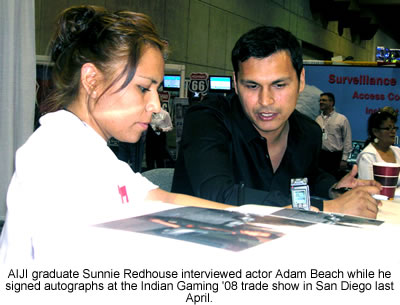 |
Canku Ota
|
 |
|
(Many Paths)
|
||
|
An Online Newsletter
Celebrating Native America
|
||
|
March 1, 2009 - Volume
7 Number 3
|
||
|
|
||
|
Native Journalism
Camp a Life Changer
|
||
|
by Annie Greenberg for
Reznet
|
||
|
credits: Reznet Photo
by Victor Merina
|
|
The AIJI is held annually at the University of South Dakota, and participants who successfully complete the program are eligible to earn three hours of college credit and possibly secure a 6-week internship once the program has ended. Application
Deadline is March 1 Sunnie Redhouse, Navajo, said the AIJI's reputation as a journalism boot camp is well deserved. The 23-year-old is a graduate of the 2005 program. Redhouse said class started at 7 a.m., sometimes went until midnight, and was full of reading news and, more importantly, writing it. "I was one of those people there who had never done anything in the realm of journalism ... I didn't know what it meant to be published, I didn't even know what an internship was," Redhouse said. "But somewhere along the way I took in what journalism was, what it feels like to see your byline there every day, and I decided to see how far I could get with it." That summer, Redhouse ended up getting an internship with the St. Cloud Times in Minnesota through the program — and since then has interned for the Albuquerque Journal and Sports Illustrated. She is now a sports writer for the Navajo Times. Passion
for Journalism Matters Most "We don't expect them to have all the training — we'll provide that. We don't expect them to have experience because we'll help with that, too," he said. "What we're looking for are those students who are curious and intelligent individuals ... with the drive to succeed." Dalton Walker, 26, went to the very first AIJI in 2001. While the experience also helped shaped his career as a future journalist, it held another significance for him, as well. "One of the coolest things is it opens doors for Native American students who wouldn't have had the opportunity to do something like this any other way," said Walker, Red Lake Chippewa. Most
of the Faculty is Native While the faculty of the AIJI has certainly remained diverse, according to Marsh, diversity in the newsroom has taken a pretty big hit as a result of industry layoffs. The Freedom Forum, the foundation that funds AIJI, has been affected by the recession as well, which is why the program has been cut from three weeks down to two and will be accepting 12 students rather than 20. But Marsh still encourages Native students interested in going into journalism to do so. "I'm confident there's going to be opportunity for journalists moving ahead in new areas," he said. "Clearly online or in digital, just maybe fewer in purely print based." Instructions and downloadable application forms are available online or by e-mailing Janine Harris of the Freedom Forum. This article was reported and written in Columbia, Mo. Annie Greenberg, Eskimo, is a journalism student at the University of Missouri in Columbia. She worked as a reporter at the Navajo Times for one year and interned as a reporter at the Sun-Sentinel newspaper in Fort Lauderdale, Fla. |
|
insert map here
|
www.expedia.com |
|
|
||
|
|
||
| Canku Ota is a free Newsletter celebrating Native America, its traditions and accomplishments . We do not provide subscriber or visitor names to anyone. Some articles presented in Canku Ota may contain copyright material. We have received appropriate permissions for republishing any articles. Material appearing here is distributed without profit or monetary gain to those who have expressed an interest. This is in accordance with Title 17 U.S.C. Section 107. | ||
|
Canku Ota is a copyright ©
2000, 2001, 2002, 2003, 2004, 2005, 2006, 2007, 2008, 2009 of Vicki
Barry and Paul Barry.
|
||
 |
 |
|
|
The "Canku
Ota - A Newsletter Celebrating Native America" web site and
its design is the
|
||
|
Copyright ©
1999, 2000, 2001, 2002, 2003, 2004, 2005,
2006, 2007, 2008 of Paul C.
Barry.
|
||
|
All Rights Reserved.
|
||
 The
Freedom Forum is now accepting applications for this summer's American
Indian Journalism Institute, an intense, two-week, all-expense paid,
hup-two-three-four, comes-with-everything-but-the-drill-sergeant
journalism boot camp.
The
Freedom Forum is now accepting applications for this summer's American
Indian Journalism Institute, an intense, two-week, all-expense paid,
hup-two-three-four, comes-with-everything-but-the-drill-sergeant
journalism boot camp.